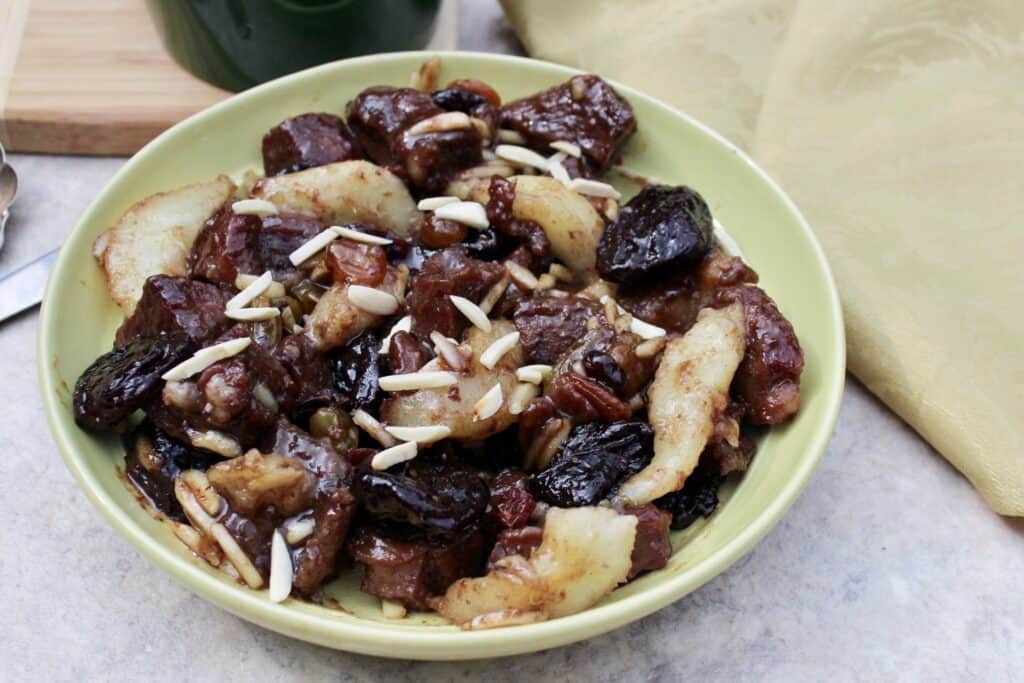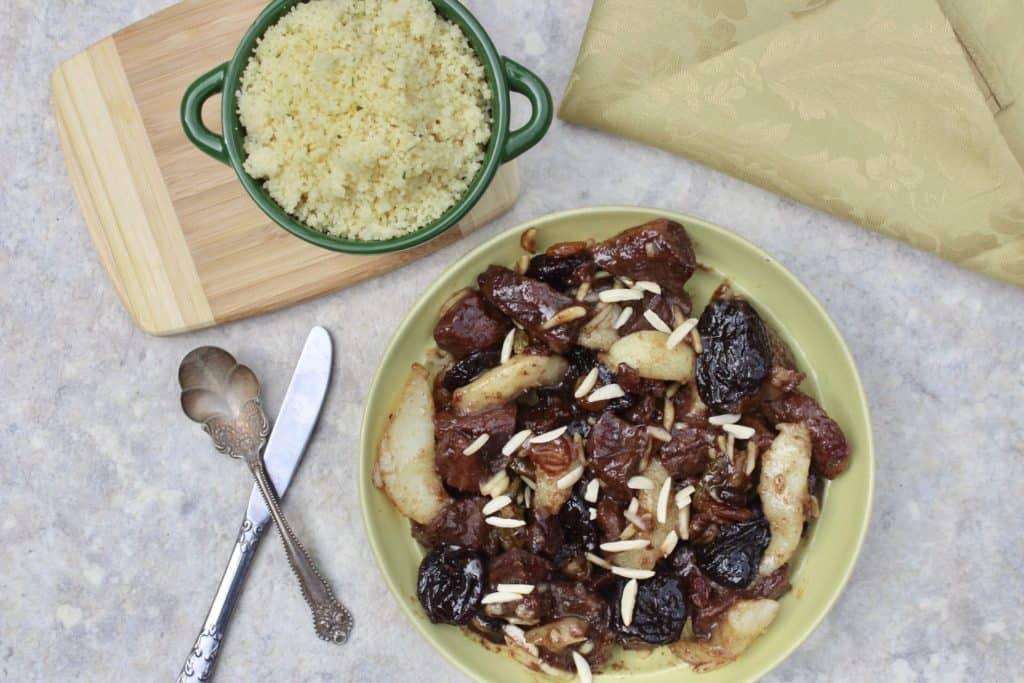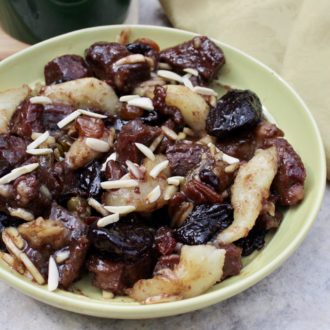This Algerian Sweet Lamb (El Hamlahlou) is a dish eaten during the month of Ramadan. It contains lamb meat, prunes, pears, raisins, and apricots. The dish is flavorful and indulgent, and is a great way to end a long day of fasting from sunup to sundown.
A Little About Me
So before we get into the more technical part of this dish, I want to tell you a little bit more about myself. I grew up in a Catholic family, that practiced our form of religion every day.

Hello Reader! I try my hardest to research recipes as best as I can before posting to ensure I am representing each culture correctly. If this recipe is from your country and I have made a mistake or you have suggestions for how to make it more authentic, I would love to hear! Please leave a comment below letting me know what should be different, and I will rework the recipe. It is always my intention to pay homage and respect to each cultural dish that I cook. Thanks for reading!
I went to Catholic school for 9 years, and spent every morning and evening in a Catholic form of prayer. A good percentage of the people in my community practice Christianity, so I never encountered a lot of religious diversity growing up.
I’ve always found other religions interesting, but to be honest, I just have never gotten around to studying them more. There are so many things in the world to learn, and this one just hasn’t been a topic of study yet!
Food Culture is Really Just Culture
Cooking Algeria gave me a really good reason to start that study. And it led me to realize that The Foreign Fork experience will push me to learn about more than just food culture. Because truthfully, food culture is really just culture.
Food culture is affected by so much, which is why it’s so interesting to me. As you’ll discover in a minute, we don’t always eat what we do solely because of taste. We also choose to eat certain foods based off of season or tradition or economy or religion. Food culture is so interesting because through it, I can learn so much more about the world than just food. And this Algerian Sweet Lamb (El Hamlahlou) is a great place to start!

A Lesson in Religion
Given that more than 99% of Algerians are Sunni Muslim, the holiday of Ramadan is an extremely important occasion in the country. Ramadan is a month-long religious worshipping period during the ninth month of the Islamic calendar. During this time, those practicing Ramadan fast from sunrise to sunset.
This Algerian Sweet Lamb (El Hamlahlou) is a traditional meal eaten during Ramadan. After a long day of fasting, a family will sit down to a table piled high with lamb meat and dried fruits. The lack of salt in the dish staves off thirst during the day, when drink is prohibited. And the dried fruits provide a sugar boost to keep energy up during the following day of fasting.
The Algerian Sweet Lamb (El Hamlahlou) vaguely resembles the Kabuli Pulao dish from Afghanistan. Both contain lamb with dried fruits, but Afghans serve the dish over a bed of rice, while couscous accompanies the Algerian Sweet Lamb.
This dish is sweet and indulgent and definitely a treat to anyone that tries it. And even more than that, it’s so easy! A little simmering, a little sprinkling, and you have a fantastic dinner for the family. Try it, my friends! Immerse yourself in the food of Ramadan, and experience the joy that comes with it.

Algerian Sweet Lamb (El Hamlahlou)
Equipment
- Saucepan
Ingredients
- 3 tbsp butter
- 2 lb lamb
- ½ tsp ground cinnamon
- 3 cups water
- ½ cup sugar
- 12 pitless prunes
- 1 unripe pear, peeled and cut into pipes
- 2 tbsp large raisins
- 2 tbsp slivered almonds
- 1 cup water
- 1 ½ tsp orange extract
Instructions
- Melt the butter in a sauce pan and then add meat to pan. Stir to brown outsides for about 5 minutes.
- Stir in cinnamon, water, and sugar. Cover with a lid and simmer for over low heat for about 45 minutes to an hour. If your lamb is very tough, keep simmering it for longer. In the middle of the cooking process, the muscle fibers can tense up. If you continue to simmer the lamb, they will relax again and become more tender.
- Add prunes, pear, raisins, and almonds.
- Cover and simmer for about 15-20 more minutes. Remove pan from heat.
- Add the orange extract to the water and then stir about 3 Tbsp of it into the dish (alternatively, you can use 2 tbsp of orange blossom water).
- Serve at room temperature with couscous.






Meghan says
I love that the pears are cut into pipes!!! Just like Grandpa used to do! ????
Alexandria Drzazgowski says
Duh, that’s the only right way to cut them! Glad you’re reading 🙂